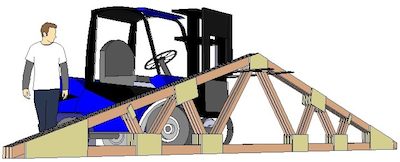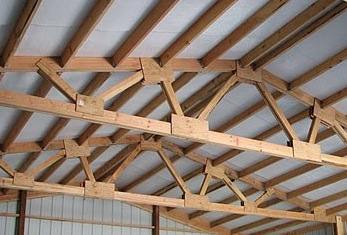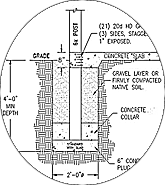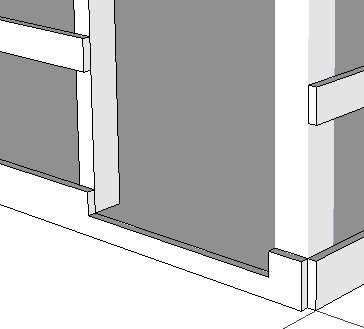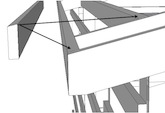| Home |
Get
Pricing |
More Photos of Work |
Trademarks - Why Hire Me? |
#1: All framing lumber is hammer driver by hand with 20d nails (4"). Compare this trademark to other, larger framing crews with air compressors and nail guns only capable of shooting 16d (3.5" nails). A smaller nail requires additional nails that pass through the lumber without a pilot/drill hole, which splits the lumber immediately, becoming more and more obvious as the years go by and the lumber shrinks. #2: Even before going into business on my own, I
was trained, and I remain true to that training, to
build heavy-duty
trusses (laminated 2-ply or 3-ply
trusses) glued and nailed together with plywood
gussets. Additionally, these trusses sit on TOP of
posts, never hanging on the sides. These trusses
are designed by my engineer and bring a fine
"well-built" feel to the building. #3: Roof purlins are set in purlin hangers
rather than resting on top of trusses. This gives
the inside of the building a very clean look, and at
least 6" more of overhead of the truss clearance. #4: To minimize the rotting of the treated posts a system of top and bottom restraints in the form of concrete "collars" is applied, rather than embedding each post in a solid hole of concrete. This allows water in the posts to escape during seasonal hot and cold expansion and shrinking, and gives the posts less contact with invasive, eroding conditions. In the case where there is no concrete floor in the building, there are bottom and top collars of concrete applied with gravel or compacted back fill in between. In the case where there is a concrete floor, there is only a bottom collar applied, then gravel/back fill, as the concrete floor ends up serving as a top restraint for the posts. These and other trademarks ensure a long-lasting investment |

#3) Purlin/Truss spacing spans up to 25ft!
#5) 2x8 PT Baseboard and concrete floor
level
#6) Top girt framing and overhang fascia
are cut sloped with roof, not left square |
Adam H. Berkey 3127 Caballo Road Kennewick, WA 99338 (509) 619-4747 WA DOL#: ADAMHHB906OL #5. Concrete floors start at the bottom of the
2x8 pressure treated base board rather than ending at the top of
a 2x6 base board. This gives you enough base board above the concrete floor to
fasten future inside sheathing to the inside of the
wall. Concrete splatter on the baseboard and posts
is scraped up rather than left behind by the builder. #6. Top girts and fascia
girts are angled to match the slope of the
roof, and provide a full flat surface for the roof
sheathing to be fastened and sealed properly. |
| Home |
Get
Pricing |
More Photos of Work |
Trademarks - Why Hire Me? |
©2024 Adam H. Berkey, All rights reserved.
